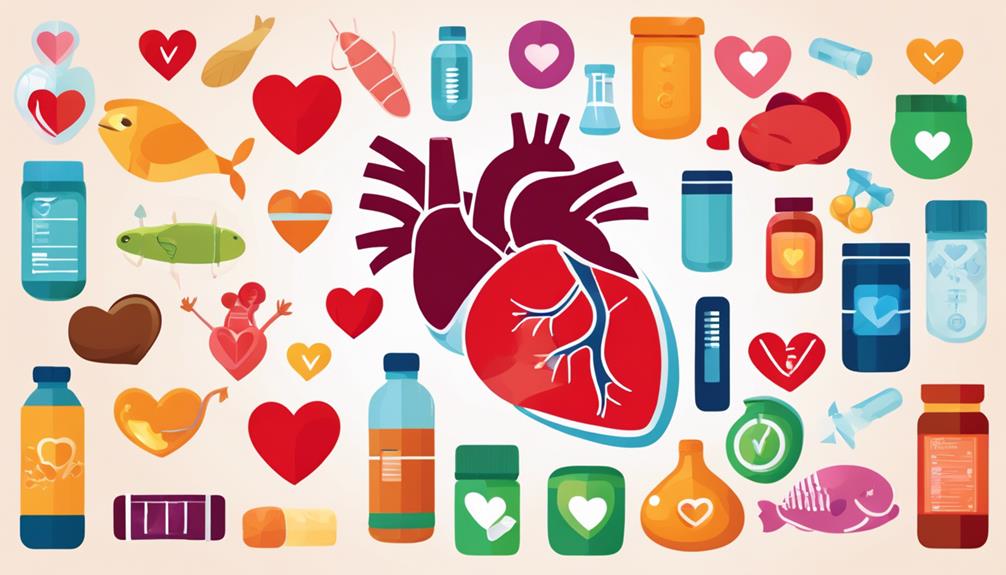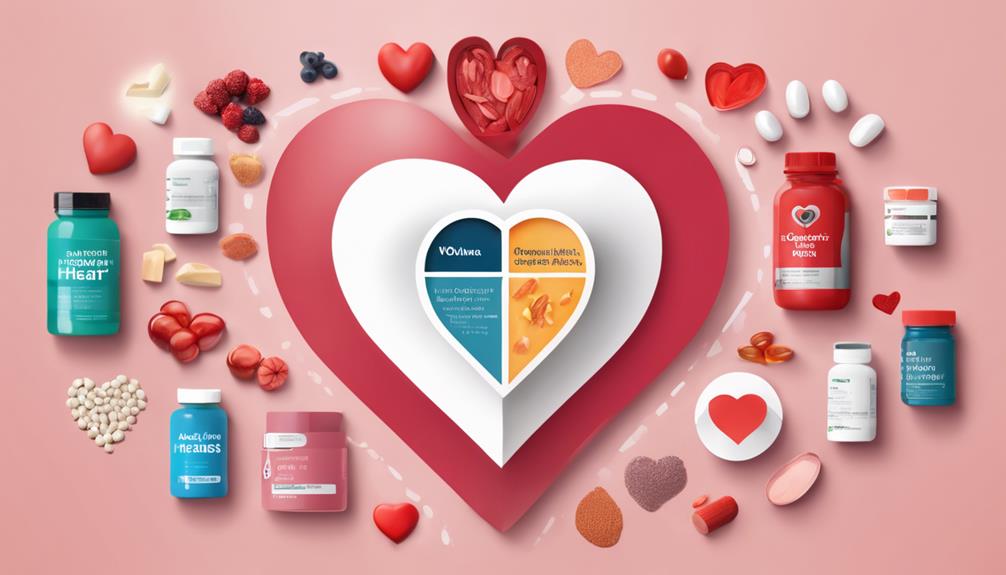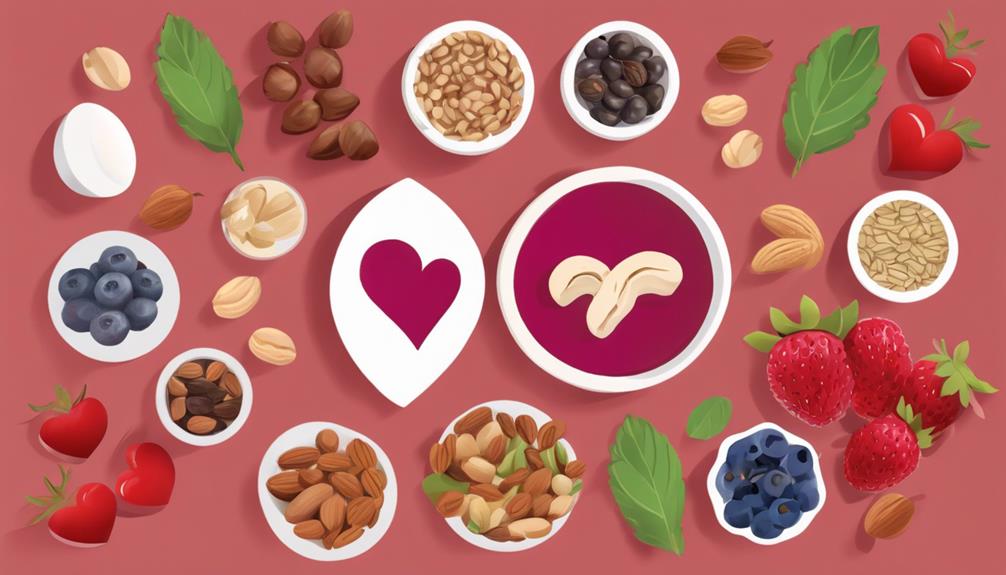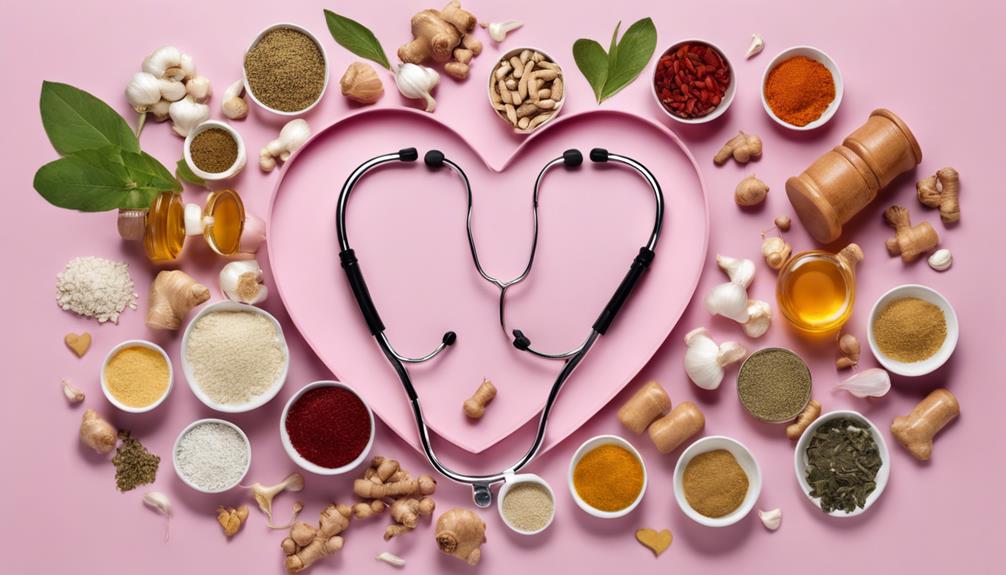How to Choose the Right Supplements for Women’s Heart Health
When it comes to selecting supplements for women's heart health, you want to make informed choices that cater to your specific needs. With the plethora of options available, it can be daunting to discern what is truly beneficial for your cardiovascular well-being. By understanding the essential nutrients and quality standards to look for, you can navigate the supplement aisle with confidence and ensure you are giving your heart the support it deserves. Remember, your heart health is paramount, so let's explore how to make the right decisions for a healthy heart.
Importance of Heart Health
Why is heart health crucial for women's overall well-being? Taking care of your heart is essential because it's the powerhouse that keeps your body running smoothly. Preventive measures play a key role in maintaining heart health. By making simple lifestyle changes, like eating a balanced diet rich in fruits, vegetables, and whole grains, you can reduce your risk of heart disease.
Regular exercise is another vital component, as it strengthens your heart muscle and improves circulation. Additionally, managing stress levels and getting enough quality sleep are crucial for a healthy heart.
Understanding the importance of heart health empowers you to take charge of your well-being. By prioritizing preventive measures and embracing lifestyle changes, you can significantly reduce your risk of heart disease and other cardiovascular issues. Remember, a healthy heart is the foundation of overall wellness, allowing you to lead a vibrant and fulfilling life.
Understanding Women's Heart Risks
To truly prioritize your heart health as a woman, it's vital to understand the specific risks you may face. Hormonal influences play a significant role in women's heart health. Estrogen, for example, has been shown to have protective effects on the heart, but its levels fluctuate throughout a woman's life, affecting heart disease risk. Additionally, progesterone and other hormones can impact cardiovascular health.
Genetic predisposition is another crucial factor to consider. Family history of heart disease can increase your risk, as certain genetic factors may make you more susceptible to heart issues. Understanding your genetic background can help you take proactive steps to mitigate these risks.
Essential Nutrients for Heart Health
Understanding the essential nutrients for heart health is pivotal in maintaining a strong cardiovascular system. When it comes to supporting heart health, incorporating certain nutrients into your diet can make a significant difference. Here are some key nutrients to consider:
- Omega-3 Fatty Acids: Found in fatty fish like salmon and mackerel, these healthy fats are known for their heart-protective benefits.
- Magnesium: Nuts, seeds, and leafy greens are excellent dietary sources of magnesium, which plays a crucial role in maintaining a healthy heart rhythm.
- Coenzyme Q10: This powerful antioxidant can be found in organ meats, whole grains, and oily fish, and is important for heart function.
- Potassium: Bananas, sweet potatoes, and spinach are rich sources of potassium, a mineral that helps regulate blood pressure and support heart health.
- Vitamin K2: Natto, cheese, and egg yolks contain vitamin K2, which aids in preventing calcium buildup in the arteries.
Consider supplement options if you struggle to incorporate these nutrients into your daily meals.
Benefits of Omega-3 Fatty Acids
Incorporating omega-3 fatty acids into your diet can provide a multitude of benefits for your heart health. Research shows that omega-3 benefits include reducing inflammation, lowering blood pressure, and decreasing the risk of heart disease. The recommended omega-3 dosage for adults is around 250-500mg of combined EPA and DHA per day, but consult with your healthcare provider for personalized advice.
| Omega-3 Benefits | Research shows omega-3s can reduce inflammation and lower blood pressure. |
|---|---|
| Heart Disease Risk | Omega-3s decrease the risk of heart disease. |
| Brain Health Support | Studies suggest omega-3s may support brain health and cognitive function. |
| Anti-Inflammatory | Omega-3s have anti-inflammatory properties. |
| Joint Health | Some evidence indicates omega-3s can benefit joint health. |
Ensuring you get adequate omega-3s through sources like fatty fish, flaxseeds, and walnuts can significantly contribute to your heart health. Remember to follow the recommended dosage for optimal benefits.
Antioxidants and Heart Health
While you may already know about the benefits of omega-3 fatty acids for heart health, another essential component to consider is the role of antioxidants. Antioxidants play a crucial role in combating inflammation in the body, which is a key factor in heart disease prevention. Here are some important points to consider:
- Antioxidants and Inflammation: Antioxidants help reduce inflammation in the arteries, lowering the risk of heart disease.
- Heart Disease Prevention: By neutralizing free radicals, antioxidants can protect the heart from oxidative stress and damage.
- Sources of Antioxidants: Include a variety of fruits, vegetables, nuts, and seeds in your diet to ensure an adequate intake of antioxidants.
- Supplements: Consider taking supplements like vitamin C, vitamin E, and coenzyme Q10 to boost your antioxidant levels.
- Consultation: Always consult with a healthcare provider before starting any new supplement regimen for personalized advice.
Incorporating antioxidants into your daily routine can contribute significantly to your heart health and overall well-being.
Role of Vitamin D in Cardiovascular Health
Vitamin D plays a crucial role in cardiovascular health, with research suggesting its impact on various aspects of heart function and disease prevention. Ensuring adequate levels of Vitamin D is essential as deficiency has been linked to an increased risk of cardiovascular issues. Studies have shown that maintaining optimal Vitamin D levels can provide significant cardiovascular benefits, such as reducing the risk of heart disease and improving overall heart function.
| Vitamin D Deficiency | Cardiovascular Benefits |
|---|---|
| Weakens heart muscles | Reduces risk of heart disease |
| Increases inflammation levels | Improves heart function |
| Affects blood pressure regulation | Supports overall cardiovascular health |
| Impacts cholesterol levels | Enhances blood vessel function |
Herbal Supplements for Heart Support
Regularly supplementing with herbal remedies can offer valuable support for heart health. Natural remedies have been used for centuries to promote overall well-being. When it comes to women's heart health, certain heart-healthy herbs can provide additional benefits. Here are some herbal supplements that you may consider incorporating into your routine:
- Hawthorn: Known for its ability to promote cardiovascular health and support healthy blood pressure levels.
- Garlic: Helps in maintaining healthy cholesterol levels and supports overall heart function.
- Turmeric: Contains anti-inflammatory properties that may benefit heart health.
- Ginger: Supports circulation and can aid in maintaining healthy blood pressure.
- Green Tea: Rich in antioxidants that are beneficial for heart health.
These natural remedies can complement a healthy lifestyle and diet, providing additional support for your heart. As with any supplement, it's essential to consult with your healthcare provider before adding herbal remedies to your regimen.
Quality and Safety Considerations
Considering the herbal supplements mentioned for women's heart health, it's important to pay attention to quality and safety considerations before incorporating them into your routine. When choosing supplements, prioritize ingredient sourcing. Look for brands that use high-quality, organic ingredients sourced from reputable suppliers to ensure purity and potency. Additionally, opt for products that have undergone third-party testing. This means an independent organization has verified the supplement's contents and ensured it meets safety standards.
Ingredient sourcing plays a crucial role in the effectiveness and safety of supplements. By selecting products with transparent ingredient information and sustainable sourcing practices, you can trust that you're consuming a high-quality product that supports your heart health.
Third-party testing adds an extra layer of assurance, confirming that the supplement is free from harmful contaminants and accurately labeled. Prioritizing quality and safety considerations in your supplement choices is a proactive step towards promoting your overall heart health.
Consulting With Healthcare Providers
To ensure optimal heart health and the safe incorporation of supplements into your routine, consulting with healthcare providers is essential. When it comes to women's heart health, your healthcare provider can offer personalized guidance based on your medical history and individual needs. Here are some key reasons why consulting with healthcare providers is crucial:
- Dietary restrictions: Your healthcare provider can advise you on supplements that align with your dietary restrictions, ensuring you meet your nutritional needs without compromising your health.
- Supplement interactions: Healthcare providers can assess potential interactions between supplements and any medications you're taking, helping you avoid adverse effects.
- Personalized recommendations: Your provider can recommend specific supplements tailored to your health goals and address any deficiencies you may have.
- Monitoring: Regular check-ins with your healthcare provider allow for monitoring of your heart health and the effects of supplements over time.
- Safety: Healthcare providers can help you navigate the vast array of supplements available, ensuring you choose safe and effective options for your heart health.
Frequently Asked Questions
Can Supplements Alone Prevent Heart Disease in Women?
Supplements alone cannot prevent heart disease in women. Lifestyle changes, like exercise, are crucial. To ensure the right supplements, seek medical advice. Your heart health is paramount, so make informed decisions with expert guidance.
Are There Specific Supplements That Interact Negatively With Heart Medications?
When it comes to your heart meds, some supplements can pose risks. Follow supplement guidelines closely and consult your healthcare provider. It's like mixing the wrong ingredients in a recipe – can be dangerous.
How Do Supplements Cater to Different Stages of Heart Health?
Supplements address various heart health stages. Hormonal changes like menopause and pregnancy affect heart health differently. Choose supplements based on your stage; for menopause, consider calcium and vitamin D; for pregnancy, folic acid is crucial. Consult your healthcare provider for personalized recommendations.
Can Supplements Be Taken in Conjunction With a Heart-Healthy Diet?
When considering supplement timing, ensure they complement your heart-healthy diet. Integrating supplements with a well-balanced diet can enhance your heart health efforts. Stay consistent and consult a healthcare provider for personalized advice.
Are There Certain Supplements More Suitable for Women With a Family History of Heart Disease?
When considering supplement recommendations for women with a family history of heart disease, focus on those supporting heart disease prevention. Be cautious of supplement interactions. Consult a healthcare provider for personalized advice tailored to your needs.
Conclusion
In conclusion, prioritize your heart health by choosing supplements rich in essential nutrients like Omega-3 Fatty Acids, Magnesium, and Coenzyme Q10. Ensure quality and safety by selecting products from reputable brands that undergo third-party testing. Remember to consult with healthcare providers for personalized guidance tailored to your individual needs. Take charge of your heart health today, nourishing your body with the right supplements for a healthier tomorrow.














